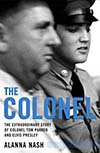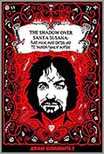|
Over the years, Colonel Tom Parker has been both championed and demonized. Some say that without the Colonel's guidance, Elvis Presley would not have never reached the pinnacle of success that he did, becoming the true king of rock 'n roll. Still others point a finger of guilt to Parker for Elvis' early demise, knowing about Elvis' substance abuses but not intervening in the least (once saying, "The only thing that's important is that he's on that stage tonight! Nothing else matters!"). The problem in finding the true story behind Colonel Tom Parker is that he hid his past behind a smokescreen of silence, half-truths and a vague promise of telling his story in an autobiography. The Colonel's book, which he titled How Much Does It Cost If It's Free?, had been promised since 1957. Yet, his book never materialized and Parker never got as far as the first word. Was it a simple ruse to keep his past hidden? What was he afraid of? In THE COLONEL, Alanna Nash does superb detective work in revealing the secrets that Andreas Cornelis van Kuijk (Colonel Tom Parker's real name) tried so hard to hide. The Colonel even kept the secret of his heritage from his own family - his stepson believed that Parker was a native of West Virginia. The most startling of these revelations is that Parker may have murdered a young woman in his native Holland when he was 20 years old. He disappeared shortly after the murder occurred, abruptly leaving for America without saying goodbye to his family or even taking money, clothes or identifying papers. Nash was also able to find Parker's long-lost military record, which tellingly gives him a discharge "on basis of Constitutional Psychopathic State, Emotional Instability". These are just a few of the stories that Nash uses to make up her psychological profile of Parker. This might sound like the stuff that normally fills the National Enquirer, but Nash tastefully displays a detectives' knack for 'just the facts' reporting. Nash gives meticulous insight into the possible motivations of Colonel Parker's actions. While she doesn't complete the jigsaw puzzle that is Colonel Tom Parker (Parker himself had well hidden many of the pieces over the years so that nobody could), she has connected enough pieces to get a very clear picture of this carnie/rock 'n roll enigma which played such a key role in rock 'n roll. Is Colonel Parker a hero or a villain? Well, that is up to you to decide after you read this book. All in all, THE COLONEL makes for one fascinating read and is my favorite rock book of the year. I'm already on my second read…
With the multitude of books available about Charles Manson & the Manson murders, you have the good ("Helter Skelter" & "The Family"), the bad ("Charles Manson: Music, Mayhem, Murder") and the ugly ("The Long Prison Journey of Leslie Van Houten: Life Beyond the Cult"). However, I'm happy to report that Adam Gorightly's "The Shadow Over Santa Susana: Black Magic, Mind Control and the "Manson Family" Mythos" falls within the "good" category (actually VERY good). In fact, I would go as far as say that I consider it an excellent primer for any curious newcomers to the Manson mythos. It is not full of boring legalese (as "Helter Skelter" often falls into) nor is it filled with the much-dated hip-speak of the early '70s (as found in "The Family"). While the Bugliosi & Sanders books are necessary reads and valuable resource tools, they are ultimately flawed in these ways. In the 34+years since the infamous murders, you would think that there would be nothing of value to add to the volumes already written. Well, Gorightly not only adds a few new findings (see our interview with Gorightly in this issue) but he also covers little-known (or at least seldom talked about) motive theories. Now, while some of these motive theories almost border on X-Files paranoia, Gorightly delivers these in an unbiased tone. I am glad to be able to choose my preferred theory of the several given, than to simply have the "Helter Skelter" motive force fed to me (like the Bugliosi' book does). Additionally, the book appendices add interesting sections such as 'Who's Who of the Manson Family', contacts (should you dare write Charlie!?) and some rare Charles Manson lyrics to a song called "Spahn City" (a parody of Jan & Dean's "Surf City"). While Gorightly does list all of his sources, there is no index for the book (what I see as it's only flaw). Where there was once a 'BIG 2' of necessary Manson books to read ("Helter Skelter" & "The Family"), I would now saw there are a 'BIG 3' - I consider "Susanna" necessary reading for any Manson studies.
Charles Manson: Music, Mayhem, Murder
I've got to admit my initial disappointment in "Charles Manson: Music, Mayhem, Murder". The title alone infers an analysis of the "music" aspect to the motives of Charles Manson. I anticipated a virtual goldmine of information from the title, and I originally picked this book as an information source since this month's EAR CANDY rock 'n roll case study will cover the music of Charles Manson. While this slender novel (only 215 pages of the story) gives very little info about the music-motive aspect, it also gives NOTHING new, i.e. no new information whatsoever. Sure, you get the opinions of Brian Wilson, Neil Young and John Phillips about the music of Charles Manson - but I've read these before from other sources. I guess this book also pales when you consider that I read it just after I had finished Gorightly's superb "The Shadow Over Santa Susana". While this book does have a Manson discography and a collection of Manson lyrics, it ultimately fails as a 'must read' for the Manson-curious. For completists only.
Turn Off Your Mind: The Mystic Sixties and the Dark Side of the Age of
Aquarius
The main attraction of this book to me was it's promise of covering the religious influences of many of the bands of the '60s, i.e. The Beatles & Brian Wilson. But what I ultimately found was a virtual who's-who of the "alternate" religions of the past 100+ years, which ultimately culminated into today's "new age" movement. Not only does Lachman cover the groundbreakers of the movement (Aldous Huxley, Allen Ginsberg, William S. Burroughs, Jack Kerouac, Henry Petrovna Blavatsky and Aleister Crowley) but he also covers the 'charlatains' (such as Carlos Castaneda and Erich von Daniken). I especially liked his coverage of the mysterious Process church. I only found one 'error' and one 'false claim' in this book. The 'error' is that it propagates the urban legend that Charles Manson auditioned for the Monkees in 1966 (Manson wasn't released from prison until 1967). The 'false-claim' is that it is Dennis Wilson that is covered, not Brian Wilson (as reported on the back cover). Sure, Dennis' involvement with the TM movement and the Maharishi are delved into, as well as his links to Charles Manson. But what about Brian's fascination with Eastern mysticism, which influenced his unreleased psychedelic masterpiece SMILE? Also, what about the Byrds' guitarist, Jim McGuinn and his immersion in the subud religious sect (McGuinn changed his first name to 'Roger' after a flirtation)? This book is a monumental source of information for those curious about the origins of "new age": you have all the important authors, a short bio and listings of their literary work. It is an excellent springboard from which I for one intend to use as a reference tool. If you want to read about the real sources of the 'new age' movement, look no further than this book. You get the straight story, no hocus-pocus!
Walk This Way : The Autobiography of Aerosmith
Although I'm no huge fan of Aerosmith, I've gotta admit that I thoroughly enjoyed this book. Sure it humongous (522 pages) - but it is never a boring read. Like the Beatles Anthology book, WALK THIS WAY gives each member of Aerosmith a chance to reminisce about the ups and the downs on their career. What I found astounding is that they pretty much remember things the same (with only a few cases where they don't) despite their heavy drug uses during their '70s success. Compare this to the Beatles in the Anthology book where there were some cases in which each member remembered things differently! While it was interesting to read about the making of their albums, I did enjoy the stories of their 'before we were famous' run-ins. For instance, Steven Tyler's 'meetings' with the Rolling Stones in 1965, Mary Weiss of the Shangri-Las, the Left Banke, the Beach Boys in 1966 and the Byrds in 1967 (Steven's early band opened for both of these acts), as well as his hilarious recollections of the original Woodstock. In addition to the band, you hear from ex-members of the band, managers, wives (both ex and recent) and producers such as Jack Douglas. Douglas not only recalls stories of producing the band, but also a few John Lennon stories. However, my favorite is how George Martin 'tricked' the band into finishing the recording of "Come Together" (for the Sgt. Pepper movie) quickly with a little white lie about Jeff Beck! This is a rare autobiography that hasn't been watered-down by the artist to show himself in only the best light.
Dream on: Livin' on the Edge With Steven Tyler & Aerosmith
Unfortunately, I got this book at the same time I bought WALK THIS WAY and read this book second. After reading the Aerosmith autobiography, this book by Steven Tyler's ex-wife delivers nothing in the way of entertainment or substance. You get the sneaking suspicion throughout the book that it is simply a 'fuck you' to an ex husband. While it is interesting in getting her account of the Andy Warhol scene of New York (in which she was a part) and the New York Dolls (she was married shortly to David Johansen), the rest of the book amounts to a glorified 'groupie-tale'. While she makes the disclaimer several times in the book to not being a groupie - that's what she basically was. And better groupie books have been written (such as Pamela DeBarres' books). What you get here is strictly National Enquirer dribble…
|
 The Colonel: The Extraordinary Story of Colonel Tom Parker and Elvis Presley
The Colonel: The Extraordinary Story of Colonel Tom Parker and Elvis Presley
 The Shadow Over Santa Susana
The Shadow Over Santa Susana